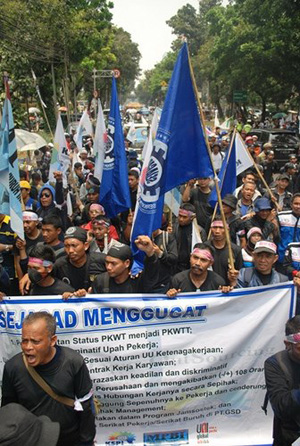- Home
- News
- Features
- Topics
- Labor
- Management
- Opinions/Blogs
- Tools & Resources
Indonesia Clamps Down On Outsourcing After Nationwide Strike
After a nationwide strike shut down many industries, workers in Indonesia have won a major victory, forcing the government to enact new rules clamping down on outsourcing.
The Indonesian government is imposing tighter restrictions on the employment of workers through outsourcing following the 3 October 2012 nationwide labor protests.
New regulations will ban outsourcing companies from hiring workers on a contract basis, Irianto Simbolon, the director general for industrial relations and social security affairs, made the announcement a hearing with lawmakers on Monday, 8 October, 2012, according to The Jakarta Post.
“Outsourced workers must be employed permanently by the company that provides the outsourcing service,” Irianto said.
The new rules will also require outsourcing companies to give their employees holiday bonuses, 12 days annual leave and health insurance.
Better monitoring of outsourcing companies should also emerge from the revision as the government plans to reduce the business-permit renewal period for this type of service from five years to three years.
“We’ll reduce the period to three years so that it will be harder for outsourcing companies to renew their permits,” he said. “Plus, every six months we will audit them and revoke their licenses should they break any rules.”
A meeting is scheduled on Thursday, 11 October 2012, to allow for final input into the proposed outsourcing rules.
The outsourcing rule revisions are a direct response to a nationwide strike last Wednesday, 3 October 2012, involving some 2.8 million workers in 16 provinces. The strikers demanded the elimination of outsourcing due to decades of unfair labor practices and exploitation.
In the Pulogadung industrial region in East Jakarta, the strike halted production activities at around 400 factories. The strikes caused estimated losses of Rp 400 billion [US$41.6 million] in the area, according to published reports.
Another strike in Batam, Riau Islands, shut down 24 industrial estates in the region.
Outsourcing Under New Scrutiny
Agencies in several provinces stepped up monitoring of outsourcing companies following the strike.
The government has so far revoked the licenses of two outsourcing firms, Graha Duta Sarana in, and Orsindo Sejahtera.
Several local governments have reportedly stopped approving business permits for new outsourcing firms.
Indra Musnawar, the leader of the Textile, Garment and Leather Workers Federation, said in The Jakarta Post that the government’s proposed revisions would not address the real problem of the outsourcing system in Indonesia.
“The law says that outsourcing is the transfer of non-core job positions inside a company to other parties for the sake of efficiency. At present, there are many outsourcing firms that serve as brokers for firms that need workers [for their core positions],” Indra told The Jakarta Post.
Indra said in The Post report that the government should enforce the 2003 Labor Law and ensuring that outsourcing could only apply to positions that did not directly relate to core production activities.
Hariyadi Sukamdani, head of the Indonesian Employers’ Association (Apindo) wages and social security division, said that Apindo members would comply with the upcoming revisions.
“We will review our current contracts with outsourcing service providers, and if we really need workers in the areas of our core businesses, we will seek to hire workers directly instead of using outsourcing firms,” he said.
Hariyadi said that the government’s major task would be to supervise the implementation of the planned rule.
“There are rampant violations because of the lack of supervision,“ he said.
List your business in the premium web directory for free This website is listed under Human Resources Directory





